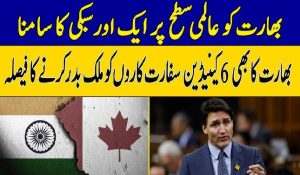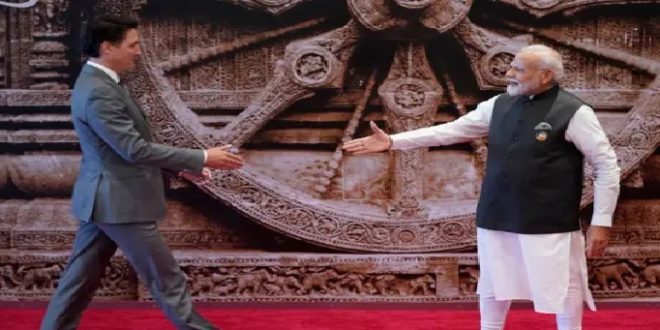17-10-2024
OTTAWA/ NEW DELHI: India and Canada have expelled their top diplomats amid escalating tensions over the assassination of a Sikh separatist on Canadian soil, marking a new low in a historically cordial relationship. While past disagreements have strained ties, none have reached this level of open confrontation.
 In 1974, India shocked the world by detonating a nuclear device, drawing outrage from Canada, which accused India of extracting plutonium from a Canadian reactor, a gift intended solely for peaceful use.
In 1974, India shocked the world by detonating a nuclear device, drawing outrage from Canada, which accused India of extracting plutonium from a Canadian reactor, a gift intended solely for peaceful use.
Relations between the two nations cooled considerably, Canada suspended support to India’s atomic energy program.
Yet neither expelled their top diplomats like they did on Monday as the row intensified over last year’s assassination of Hardeep Singh Nijjar, a Canada-based Sikh leader labelled a terrorist by India.
The tit-for-tat expulsions followed PM Justin Trudeau’s claim that Canadian police were investigating allegations of Indian agents’ and the Indian government’s direct involvement in the June 2023 killing.
Canadian police further accused Indian agents of involvement in “homicides, extortion and violent acts” targeting pro-Khalistan supporters advocating a separate Sikh homeland in India. Delhi rejected the allegations as “preposterous”.
There are some 770,000 Sikhs living in Canada, home to the largest Sikh diaspora outside the Indian state of Punjab. Sikh separatism rooted in a bloody insurgency in India during the 1980s and early ’90s continues to strain relations between the two countries. Canada has faced sharp criticism from Delhi for failing to oppose the pro-Khalistan movement within its borders. Canada, says India, is aware of local Khalistani groups and has been monitoring them for years.
“This relationship has been on a downward trajectory for several years, but it’s now hit rock bottom,” Michael Kugelman of the Wilson Center, an American think-tank, told media.
 “Publicly laying out extremely serious and detailed allegations, withdrawing ambassadors and top diplomats, releasing diplomatic statements with blistering language. This is uncharted territory, even for this troubled relationship.”
“Publicly laying out extremely serious and detailed allegations, withdrawing ambassadors and top diplomats, releasing diplomatic statements with blistering language. This is uncharted territory, even for this troubled relationship.”
Other analysts agree that this moment signals a historic shift.
“This represents a significant slide in Canada-India relations under the Trudeau government,” added Ryan Touhey, author of Conflicting Visions, Canada and India in the Cold War World.
A history professor at St Jerome’s University in Waterloo, Touhey notes that a key success of former Prime Minister Stephen Harper’s government was fostering a “prolonged period of rapprochement” between Canada and India, moving past grievances related to Khalistan and nuclear proliferation.
“Instead, a focus was placed on the importance of trade and education ties and people-to-people links given the significant Indian diaspora in Canada. It is also worth noting that the Khalistan issue had seemed to have disappeared since the beginning of the millennium. Now it has suddenly erupted all over again.”
Still, Harper was not faced with allegations from Canadian security services of a potential link between agents of India’s government and the killing of a Canadian citizen. On Monday, Canadian police said they had approached at least a dozen people over the past few months, specifically members of the pro-Khalistan movement, because they believed they faced credible and imminent threats.
They alleged subsequent investigations uncovered “a significant amount of information about the breadth and depth of criminal activity orchestrated” by India agents, and consequential threats to Canadians. (Int’l News Desk)
 Pressmediaofindia
Pressmediaofindia




